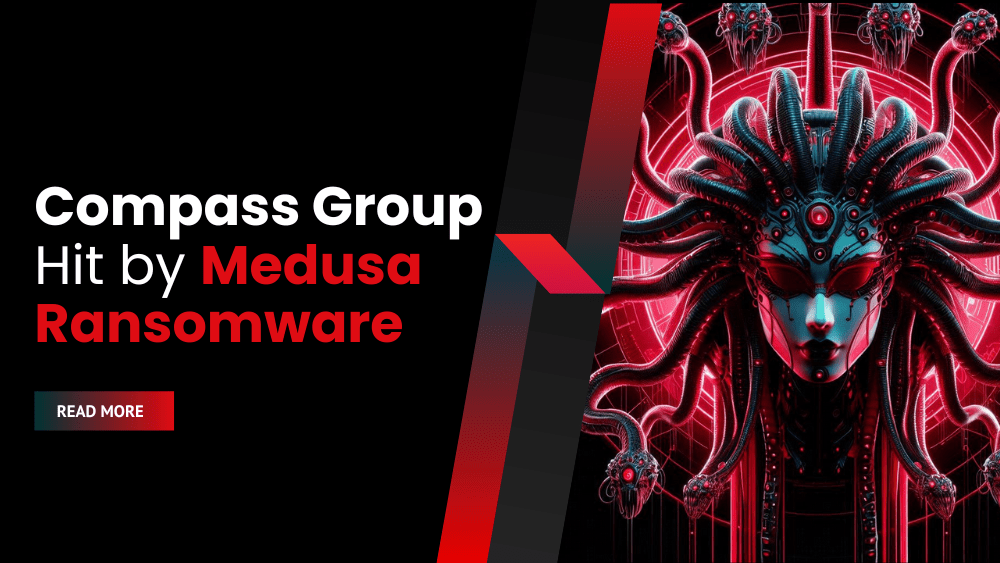Sydney, Australia – The Compass Group, a global leader in food services, has confirmed a major cyberattack targeting its systems. The attack, which occurred in late October 2023, involved the deployment of the Medusa ransomware, a highly sophisticated and disruptive threat that has shaken the company’s operations.
A Targeted Attack on Compass Group’s Critical Infrastructure
The attack, which remains under investigation, was clearly targeted.
“We can confirm that we have experienced a cyber incident that has impacted some of our systems,” a Compass Group spokesperson stated. “We are working with cybersecurity experts to investigate the incident and restore our systems.”
While the company has not publicly disclosed the specific details of the attack, evidence suggests that the attackers were focused on compromising Compass Group’s critical infrastructure and data.
The Medusa Menace: A Relatively New Player in the Ransomware Landscape
The Medusa ransomware, a relatively new player in the cybercrime landscape, is known for its aggressive tactics and high-impact attacks. This attack on Compass Group underscores the growing threat posed by ransomware groups, who are increasingly targeting large organizations with sophisticated and disruptive attacks.
“Medusa is a particularly nasty piece of malware,” said Dr. Emily Carter, a cybersecurity expert at the University of Sydney. “It uses a combination of techniques to infiltrate and compromise systems, making it difficult to detect and remove.”
The Impact of the Medusa Ransomware Attack
The attack had a significant impact on Compass Group’s operations, disrupting critical functions like payroll, supply chain management, and client communication.
“The impact of the attack has been significant,” acknowledged the Compass Group spokesperson. “We are working to minimize disruption to our clients and employees.”
Reports indicate that the attack caused significant downtime and operational disruption across multiple regions. “We’ve heard that the attack has affected operations in several countries,” said a source close to the investigation. “It’s a major disruption for a company of Compass Group’s size.”
Technical Details of the Compass Group Cyberattack
The Medusa ransomware utilizes a combination of techniques to infiltrate and compromise target systems. These include:
- Exploiting vulnerabilities: The attackers likely exploited known vulnerabilities in Compass Group’s systems to gain initial access. “Medusa is known to exploit common vulnerabilities in software,” explained Dr. Carter. “It’s likely that the attackers found a weakness in Compass Group’s systems and exploited it to gain access.”
- Lateral movement: Once inside the network, the attackers moved laterally, gaining access to critical systems and data. “This is a common tactic used by ransomware attackers,” explained Dr. Carter. “They use stolen credentials or other methods to move across the network, looking for valuable data to encrypt.”
- Data encryption: The Medusa ransomware then encrypted sensitive data, rendering it inaccessible to Compass Group employees. “The encryption used by Medusa is very strong,” said Dr. Carter. “It’s designed to make it very difficult to recover data without the decryption key.”
- Ransom demands: The attackers likely demanded a ransom payment in exchange for decrypting the data and restoring access to compromised systems. “Ransomware attackers typically demand a payment in cryptocurrency,” explained Dr. Carter. “They often threaten to release the stolen data if the ransom isn’t paid.”
How Compass Group Responded to the Cyberattack
Compass Group has confirmed that it is working closely with cybersecurity experts to investigate the attack and restore its systems. The company has also taken steps to mitigate the impact of the attack, including:
- Containing the attack: The company has taken steps to isolate the affected systems and prevent further spread of the ransomware. “We have taken steps to contain the incident and prevent further spread,” said the Compass Group spokesperson.
- Restoring systems: Compass Group is working to restore its systems and recover lost data. “We are working to restore our systems as quickly as possible,” said the spokesperson.
- Communicating with stakeholders: The company is communicating with its clients, employees, and other stakeholders about the attack and its impact. “We are committed to keeping our stakeholders informed about the situation,” said the spokesperson.
Lessons Learned from the Compass Cyberattack
The Compass Group attack highlights the importance of robust cybersecurity measures for all organizations, regardless of size. Key takeaways include:
- Stronger defenses: Organizations need to invest in strong cybersecurity defenses, including firewalls, intrusion detection systems, and endpoint security software. “Companies need to take cybersecurity seriously,” said Dr. Carter. “They need to invest in strong defenses and make sure they are up-to-date.”
- Regular updates: Regularly updating software and patching vulnerabilities is crucial to prevent attackers from exploiting known weaknesses. “Software updates are critical for security,” emphasized Dr. Carter. “Companies need to make sure they are patching vulnerabilities as soon as possible.”
- Employee training: Educating employees about cybersecurity risks and best practices is essential to prevent phishing attacks and other social engineering tactics. “Employees are often the weakest link in cybersecurity,” said Dr. Carter. “They need to be trained on how to identify and avoid phishing attacks and other threats.”
- Incident response planning: Having a comprehensive incident response plan in place is critical for responding effectively to cyberattacks. “Companies need to have a plan in place for responding to cyberattacks,” said Dr. Carter. “This plan should include steps for containing the attack, restoring systems, and communicating with stakeholders.”
The Compass Group attack is a stark reminder of the evolving threat posed by ransomware groups. As these groups become more sophisticated, organizations need to adapt and enhance their cybersecurity defenses to stay ahead of the curve. “Ransomware is a growing threat,” said Dr. Carter. “Companies need to take steps to protect themselves, or they could be the next victim.”









